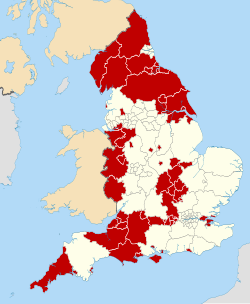Dorset | |
|---|---|
 County Hall, Dorchester, the headquarters of Dorset Council | |
 The Dorset unitary authority area within the eponymous ceremonial county. To the east is the Bournemouth, Christchurch and Poole unitary authority area. | |
| Coordinates: 50°48′N2°18′W / 50.800°N 2.300°W | |
| Sovereign state | United Kingdom |
| Constituent country | England |
| Region | South West England |
| Ceremonial county | Dorset |
| Historic county | Dorset |
| Admin HQ | County Hall, Dorchester |
| Government | |
| • Type | Unitary authority |
| • Governing body | Dorset Council |
| • Chair | Cllr Val Pothecary |
| • Leader | Cllr Spencer Flower |
| Area | |
• Total | 962 sq mi (2,491 km2) |
| • Rank | 9th (of 296) |
| Population (2024) | |
• Total | 389,947 |
| • Rank | 20th (of 296) |
| • Density | 410/sq mi (157/km2) |
| Ethnicity (2021) | |
| • Ethnic groups | |
| Religion (2021) | |
| • Religion | List
|
| Time zone | UTC+00:00 (Greenwich Mean Time) |
| • Summer (DST) | UTC+01:00 (British Summer Time) |
| Postcodes | |
| ISO 3166-2 | GB-DOR |
| ONS code | E06000059 |
| NUTS | UKK22 (partially) |
| Website | www |
Dorset is a unitary authority area within the larger ceremonial county of Dorset, South West England. It covers the entire ceremonial county with the exception of Bournemouth, Christchurch and Poole in the south-east. The largest settlement is Weymouth, and the administrative centre is Dorchester.
Contents
The unitary authority area was formed on 1 April 2019 during a local government restructure. Prior to this, Dorset was a non-metropolitan county containing six non-metropolitan districts, and was governed by a county council and six district councils. [2] [3] The unitary authority area was created by abolishing the county, districts, and their councils, and establishing a new non-metropolitan county and a new non-metropolitan district, each with the same area as the former districts of East Dorset, North Dorset, Purbeck, West Dorset, and Weymouth and Portland. The area of the sixth former district, Christchurch, was incorporated into the new unitary authority area of Bournemouth, Christchurch, and Poole. The new Dorset Council was constituted as a non-metropolitan district council with the responsibilities of a non-metropolitan county council. The first elections to the council took place on 2 May 2019. [4]

